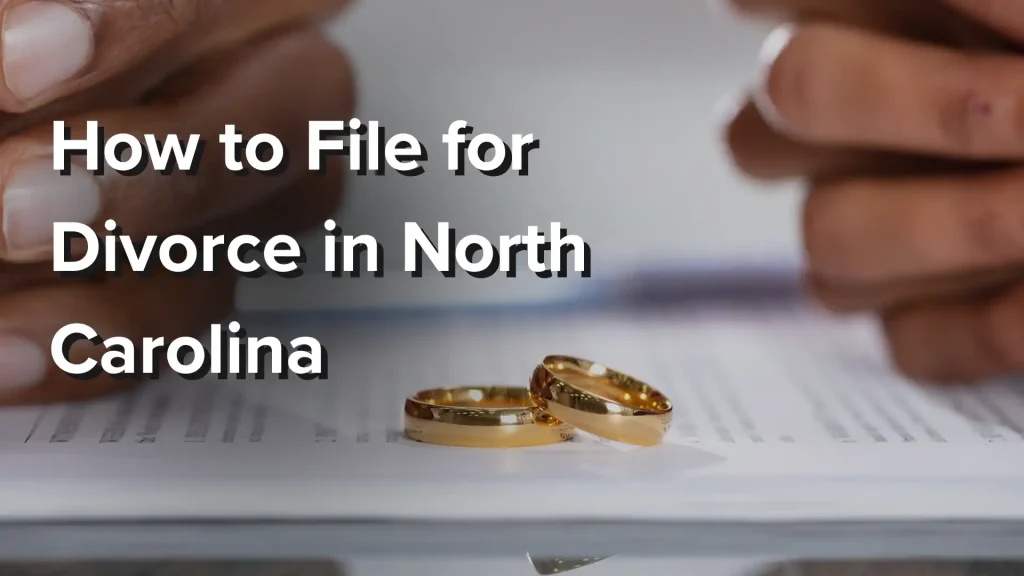
Divorce changes nearly every part of your life—where you live, how you budget, and how you care for your kids. It also comes with a legal process that may initially feel unfamiliar or overwhelming. Knowing what to expect can help you take the next step more confidently. Understanding the divorce process and legal requirements gives you the clarity and control to move forward confidently. It also enables you to work toward a fair settlement that supports your future and protects what matters most.
Winning the divorce process in North Carolina follows clear separation, paperwork, and property division rules. A divorce lawyer in Raleigh can walk you through each step and help protect your rights while you move forward.
Types of Divorce in North Carolina
North Carolina recognizes two main types of divorce: absolute divorce and divorce from bed and board.
- Absolute divorce ends the marriage legally and permanently.
- Divorce from bed and board is a form of legal separation based on fault, such as cruelty or abandonment. It doesn’t end the marriage, but can give one spouse legal protections while living apart.
Most people seek absolute divorce after meeting the state’s separation requirement. That process includes the right to request spousal support, decide child custody, and property division.
Separation Requirement
North Carolina requires at least one year of separation before filing for absolute divorce. During this time, the couple must live in separate homes with the intent to remain apart, and at least one spouse must believe the marriage has ended.
You don’t need a formal agreement to start the separation clock, but you must show the court that the separation lasted at least 12 continuous months. Temporary reconciliation resets the clock and starts the count over.
One spouse must also live in North Carolina for at least six months before filing. This residency requirement helps the court confirm that North Carolina has legal authority over the case, which becomes especially important if one spouse decides to contest the divorce or challenge the terms of the separation.
Steps in the Divorce Process
The divorce process in NC moves through a clear set of steps. While some parts look different depending on the case, the overall path stays the same:
- File the Complaint – One spouse files a formal request for divorce at the county courthouse.
- Serve the Other Spouse – Legal notice must reach the other spouse through certified mail, a sheriff, or a process server.
- Wait for a Response – The receiving spouse has 30 days to respond. That response may include a counterclaim.
- Exchange Financial Documents – Both spouses share information about income, debts, and assets in contested cases.
- Attend a Hearing – If both spouses agree, the court may finalize the divorce with minimal involvement. If they don’t, a hearing or trial will follow.
- Finalize the Divorce – A judge signs the final divorce order, making it official.
A spouse can also request support, custody arrangements, or property division at any point. Some couples resolve these issues through negotiation, while others rely on a judge to decide.
Divorce Paperwork and Filing Requirements
Divorce involves more than just filling out forms. The paperwork must match your situation – whether you’re dividing property, requesting custody, or seeking support.
To begin the process, you must submit:
- A divorce complaint
- A civil summons
- A domestic civil action cover sheet
- A filing fee (or a divorce petition to waive it)
Each document must follow formatting rules and be filed with the correct county clerk. Mistakes can delay the process or affect your rights.
A divorce lawyer in Raleigh can prepare these documents and ensure they reflect your goals, especially if you plan to request custody, spousal support, or property distribution.
Please read more about divorce settlements here: Negotiate Divorce Settlement With Your Spouse
Legal Separation vs. Divorce in NC
People sometimes confuse legal separation with divorce. You don’t need to file paperwork in North Carolina to be “legally separated.” Living apart with the intent to end the marriage starts the separation period.
Divorce from bed and board, however, requires court action. It offers legal protection for spouses in situations involving abuse, abandonment, or substance use, but does not dissolve the marriage.
Equitable Distribution of Property
North Carolina follows the equitable distribution model for dividing marital property. That doesn’t always mean a 50/50 split.
Courts consider:
- The length of the marriage
- Each spouse’s income and debts
- Contributions to the home or children
- Any waste or misuse of assets
Property includes anything earned or acquired during the marriage, from houses to retirement accounts. Separate property, such as gifts or inheritances, typically stays with the original owner.
Child Custody and Support Rules
Divorcing parents must agree on legal custody, physical custody, and visitation, and a parenting schedule – or ask the court to decide.
Support payments are based on the North Carolina Child Support Guidelines, which consider income, parenting time, and the child’s needs. Courts may adjust these amounts if one child has extraordinary expenses, such as medical care or private school.
Spousal Support Laws in NC
 Spousal support, also called post-separation support or alimony, depends on the needs and resources of each spouse. Courts look at:
Spousal support, also called post-separation support or alimony, depends on the needs and resources of each spouse. Courts look at:
- The length of the marriage
- Each person’s income, education, and work history
- Contributions to the household or a spouse’s career
- Health and age
- Fault-based conduct, including infidelity or abandonment
Temporary support may help cover immediate expenses during the separation period. Long-term alimony may apply when one spouse gave up career opportunities or needs time to become financially independent.
Spouses can reach a support agreement through negotiation or mediation. If not, a judge decides based on evidence presented during the divorce process. However, many couples choose a collaborative divorce instead, working with legal and financial professionals to find solutions without going to court.
Uncontested Divorce in NC
Filing for divorce in NC doesn’t always involve a legal fight. Some couples agree on property, parenting, and support from the start and may qualify for an uncontested divorce.
These cases move faster, involve fewer disputes, and often cost less. A lawyer can still play an essential role by drafting clear, enforceable agreements that prevent future misunderstandings.
Talk with a Divorce Lawyer in Raleigh
Divorce brings legal and personal challenges, especially when children, finances, or the family home are on the line. Questions can surface quickly, and the answers aren’t always obvious.
At Marshall & Taylor PLLC, we will explain your rights clearly and push for outcomes that protect your future. Whether you plan to file or want to understand your options, a divorce lawyer in Raleigh can help. Our team is here to help you understand your rights and take the first step toward securing the necessary benefits. Contact us today at (919) 833-1040 to schedule a private consultation.
Related Post
How Are 401(k)s Divided in Divorce?
How Are IRAs Divided in Divorce?
Creating a Co-Parenting Agreement in North Carolina: What You Should Know
